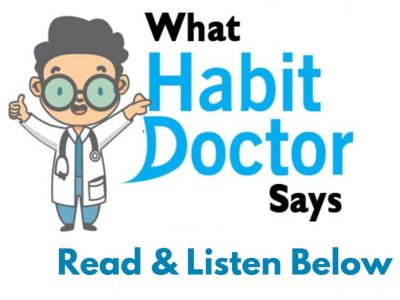Man is a product of habits and habits die hard. Habits speak on the type of life one leads. Some of our habits can provide for a better way of life, while some can be detrimental.
Habits are acts one has practised way down life. They are actions or acts that we do almost involuntarily, very often repeatedly due to non-interference from external forces. Good habits can be inculcated and practised. With conscious effort, some habits that have proved detrimental can be changed to advantage.
Here is an effort to document some and propositions to change habits to one’s advantage.
Habits contribute to two facets of existence- the personal and the societal. It is worthwhile to apply the art and the science of habits to a better life.
There is a science to all acts of life- sleep and eating, wash and the ablutions, use of natural resources, social contacts and personal habits.
Sleep time is designed by nature for all animals. The adages- “early to bed and early to rise makes a man healthy wealthy and wise” and “the early bird catches the worm” have proved true through ages. Sleeping late and rising late can be detrimental to health and wealth. Sleep deprivation has proved many a time, in contributing to health issues. Nature calls for the body to rest at least one-third of its living hours in a day, which should be at least eight hours. Six to eight hours of sound sleep should be the norm. To succeed in life, a sound body capable of responding to all stresses of modern life is required. So, sleeping habits need to be adequate, to provide for physical and mental health. This is the science of sleep.
The art of sleeping is to keep it private and never to sleep in public. Our sleeping habits need to change, to make life more meaningful.
Our body weight determines the volume of food we need. This is the science of eating. But what is eaten usually depends on availability. Determining the frequency of food depends on the hunger level of each body. Current eating habits – junk food, too much sugar and spices could prove detrimental in the long run. It is not practical to measure up the volume of nourishment each person intakes. But including greens and fresh fruits would help. Snacking off and on would never be advisable. A scientific approach to culinary habits provides a shortcut to success in life.
Wash and the ablutions
Being clean and being hygienic are two different factors. Habits of being clean include a daily bath, clean clothes and living in clean surroundings. Being hygienic is to ensure that physical, chemical or biological factors do not affect our wellbeing resulting in illness, where water plays a major role in wellbeing. Good clean potable water has been the hallmark of civilization. Prudent use of water contributes to a healthy and wealthy society. It is hence advisable to consciously give up habits that contribute to water wastage and those that pollute this elixir of life.
Societal living calls for living as societies. Social contact thus becomes inevitable. But it is not that one should walk into what is known as the “personal space” of another individual. Success comes from effective interpersonal contacts maintaining a scientific social distance at all times and changing personal habits such as using tobacco, alcohol or drugs. Accepted personal habits improve the acceptability of individuals.
Habit also means one’s attire
Attire speaks volumes in the personal assessment. Garish and eye-catching individual dress code should never be practised. Attire needs to be appropriate for the occasion.
Changing habits to advantage requires a conscious effort, never to practice habits that remain unacceptable to others and society at large.



Implementing your habits is like building a fortress of health. Your blog is the blueprint, and I’m constructing a stronghold of well-being.